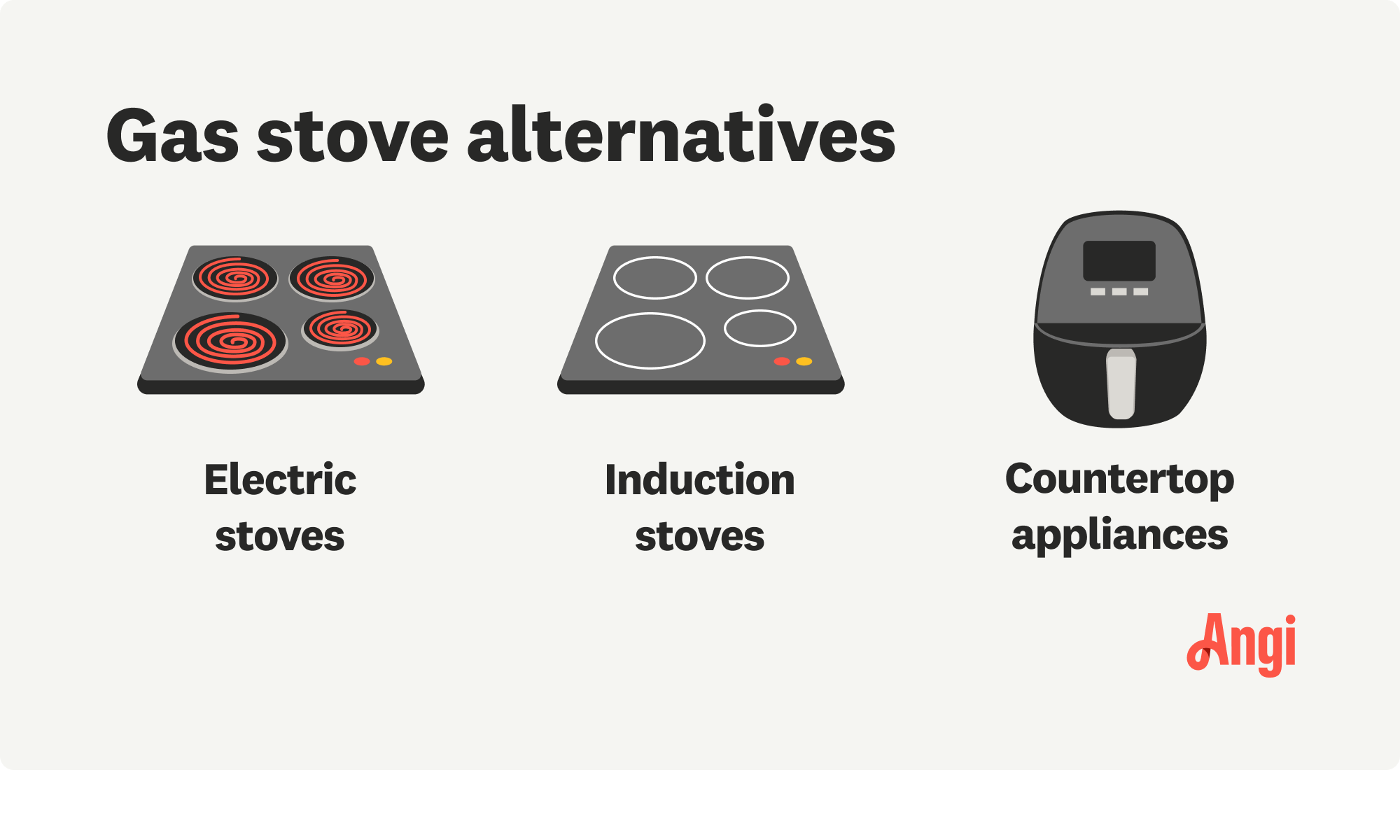
If your refrigerator has been damaged, refrigerator door dent repair cost will vary based on the imperfection's size, depth, and location. Use our guide to estimate how much you'll spend on refrigerator dent repair.
It’s time to move on from your old gas stove


Some regions are phasing out of gas stoves in residential homes.
Gas stoves are a safety risk to your home.
Regular electric stoves cost from $770 to $1,700. Induction stoves cost from $600 to $9,200 but are, on average, around $2,200.
Instapot, air fryers, and toaster ovens are great alternatives to gas stoves.
While many still insist that cooking over a burning flame is an irreplaceable experience, the era of gas stoves is coming to an end. But don’t worry: plenty of alternatives to gas stoves work just as well, if not better. The chef in you will not be disappointed with these highly capable and energy-efficient options.
The main reasons for replacing gas stoves are safety concerns. Gas is highly toxic and inflammable. If you left your gas stove on, you would come home to a major hazard to handle. Other reasons, such as aging connections and faulty safety valves, can also lead to a gas leak. Gas stoves also pose threats to our environment. According to a recent study, gas stoves have contributed to over 25 million tons of carbon pollution in the US.
Starting with Berkeley, CA, more cities have joined the movement to ban gas stoves. In 2019, Berkeley banned gas hookups in most new homes and commercial buildings. Since then, more California cities have followed Berkeley’s steps, including San Francisco Bay and Sacramento. A similar ban on buildings less than 7 stories tall went into effect in New York last December.
However, recent clarifications clarified that no new regulations will impact existing households with gas stoves. The rules appear only to restrict new developments.

| Electric Stoves | Induction Stoves | Countertop Appliances |
|---|---|---|
| PROS: More energy efficient, fewer safety hazards. | PROS: Accurate temperature control, extremely energy-efficient, the safest option. | PROS: Takes up less space. Agility and flexibility. |
| CONS: Slow heating, lack of precision temperature control. | CONS: High up-front cost. May need to replace cookware. | CONS: Limited cooking abilities. May need multiple appliances to fully replace the gas stove. |
Electric stoves are an affordable and popular alternative to gas stoves. On average, electric stoves range from $600 to $1,300, and most are expected to last up to 13 years. Routine maintenance is essential for keeping electric stoves functioning and preventing fire hazards from failing stove parts.
Electric stoves are slightly safer than gas stoves since there is no open flame. It is also more energy efficient. However, it takes a lot longer for an electric cooktop to heat to the desired temperature. Lack of temperature control precision is another main complaint with electric stoves.
Induction stoves have quickly become the most popular alternative to gas stoves. They are three times more efficient than gas ranges and 10% more efficient than standard glass-top electric stoves.
Induction stoves create an electromagnetic field when electric current goes through the metal coil underneath the ceramic glass surface. The field turns the cookware into its own heat source. The only real restrictions with induction stoves are high upfront investment and cookware limitations. Induction stoves cost from $600 to $9,200 but are around $2,200 on average. Since they only work with cookware made with magnetic metals, such as cast iron, you may need to spend more to replace your cookware.
However, the cost is compensated by the significant energy savings that will happen down the road. Compared to a conventional electric stove, an induction stove only takes about half the time to bring water to boiling. On average, an induction stove lasts up to 10 years or for about 10,000 hours of use.

A third alternative to gas stoves is countertop appliances. These appliances usually take up less space. However, you might need multiple appliances to fully replace your gas stove.
Air fryers are an extremely energy-efficient alternative to gas stoves, yet do not cost anywhere near an induction cooktop. On average, air fryers cost from $50 to $350 and last 5 to 8 years. Newer models can cook whole meals on the go with separate compartments for proteins and vegetables. Since air fryers don’t use oil, they also make your meals healthier and are great choices for individuals struggling with blood pressure and cholesterol.
Toaster ovens can handle a decent range of tasks that traditionally require turning on the stove, from baking pastry to making regular meals. Like electric stoves, toaster ovens heat food using a metal coil. While a toaster oven only has one cooking coil and can only handle one function at a time, it doesn’t require time to preheat like electric stoves do.
Multicookers are another efficient option. If you usually cook simple, straightforward meals, you can almost fully replace your stove with a robust multicooker. Even if some more complex tasks still require you to turn on the stove, multi-cookers can still help you save energy and make cooking cleaner by handling the easier tasks. Some multicookers also function as a pressure cooker.
Transitioning from gas cooking to cooking with an electric or induction stove will involve a learning curve. Not having a visible flame means you will learn to gauge the temperature. It will take practice before you understand how long it takes for your new stove to reach your desired heat level and how sensitive the temperature control is.
You also need to make sure your old gas supplies are properly capped. Therefore, you should always hire a professional appliance installer to remove the gas stove and install the new range. Leaving an old gas line open can be dangerous to your health and your home.
From average costs to expert advice, get all the answers you need to get your job done.

If your refrigerator has been damaged, refrigerator door dent repair cost will vary based on the imperfection's size, depth, and location. Use our guide to estimate how much you'll spend on refrigerator dent repair.

One of the most common fridge problems is a blown compressor motor. Use this guide to determine the cost of replacing the compressor and to estimate the total cost of your repair.

Explore the common types of oven repairs and how much they cost based on the problem, the part, and the type of oven. This guide will tell you the average cost to repair an oven.

Moving a wood stove is no small feat, but it’s possible to move on your own. Here’s how to move a wood stove while protecting yourself and your home.

Looking to extend the life and increase the efficiency of your dishwasher? Learn how to clean a dishwasher drain to enjoy a clean, dry load every time.

Without proper ventilation, a washing machine can clog, leak, and cause a dangerous mess in your home. Learn how to vent a washing machine drain with this guide.